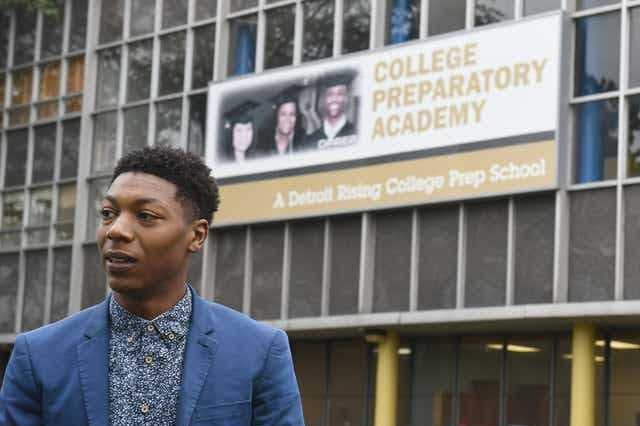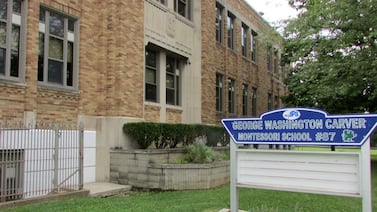Under a settlement in the Detroit “right-to-read” lawsuit announced Thursday, the state will pay $2.72 million to the Detroit district for literacy programs and $280,000 total to the seven student plaintiffs in the case to further their educations.
Gov. Gretchen Whitmer also agreed to propose legislation before 2022 that would provide the Detroit Public Schools Community District with $94.4 million for literacy initiatives.
The settlement requires the Michigan Education Department to provide guidance to districts on literacy and establishes two Detroit-based task forces outside the state government that will advise the governor on literacy and education in Detroit. It directs Whitmer to take steps toward eliminating financial oversight placed over the district as part of the controversial 2016 state law that helped stabilize the district’s finances.
And it gives leaders of the Detroit district something they’ve long requested: the ability to raise money from taxpayers in Detroit for badly needed school building repairs, which the district lost as part of the 2016 law.
“Students in Detroit faced obstacles to their education that inhibited their ability to read — obstacles they never should have faced,” she said in a statement Thursday. “I look forward to working with the legislature to provide funding for Detroit schools and districts across the state.”
It remains to be seen if the Republican-led legislature will agree to the additional spending, especially in the midst of a coronavirus-induced budget crunch.
Those funds alone wouldn’t be enough to reverse the fortunes of a district whose test scores are the worst among all major U.S. cities and whose school buildings still need as much as $1 billion in repairs.
“The dollar amounts are not insignificant, but they’re not particularly substantial,” Mike Addonizio, a professor of education policy at Wayne State University, said. The money, he added, “will require legislative approval, and that may not be easy.”
Still, the settlement marks a major legal milestone, one that could set the stage for lawsuits in other states when schools fail to teach students to read. And it represents a victory for the many Detroiters who blame the state for the lackluster condition of the city’s public schools.
Detroit school district superintendent Nikolai Vitti said the settlement represents a rebuke to the state’s intervention into schools through emergency management. Still, he said the settlement doesn’t go far enough.
“Unfortunately, this settlement does not make the students or the school district whole after the abomination of emergency management. I blame the ugly face of politics for that,” Vitti said in a statement.
He credited Whitmer for prioritizing K-12 education more than her predecessors, but said, “that is a low bar to jump.”
One thing is certain: The new federal guarantee of basic literacy — long sought by some education advocates — is safe for now.
“By accepting the Court’s decision that a minimum basic education is a foundational requirement for full participation in our democracy, Whitmer is acknowledging that no child should be denied his or her right to fully pursue the American Dream based on the color of their skin or their family’s income,” said Mark Rosenbaum, director of Public Counsel Opportunity Under Law, who helped represent the Detroit students.
The notion of a right to read is hotly contested. Conservative groups, including the Michigan legislature, had hoped that the full 28-judge Sixth Circuit Court would immediately overturn the opinion, which was issued by a panel of three judges. Instead, experts expect more lawsuits from students in districts where many students struggle to read.
“This will open it up not just for Detroit, but for everywhere. Every school in the country,” said Jamarria Hall, one of the student plaintiffs in the case.
He hopes the settlement will remedy issues with deteriorating school buildings, outdated technology, and better books. He experienced such conditions as an Osborn high school student, which precipitated the lawsuit in the first place.
Whitmer had come under intense pressure to settle the lawsuit. Education advocates worried that if she appealed the case, conservative judges in the Sixth Circuit or the Supreme Court would decide against the students and shoot down the notion of a federal right to read.
“No child should have to go to court to get a quality education. Today’s settlement ends the long-standing fight to ensure that every Michigan student has access to at least a basic education,” Amber Arellano, executive director of the advocacy group EdTrust Midwest, said in a statement on the settlement.
“These investments are not only right for Detroit students, but can provide a road map to support students in high-poverty communities across Michigan, rural and urban.”
Since the lawsuit was filed in 2016, it has been a source of hope for activists like Helen Moore, who saw it as a way to force the state to provide more resources to Detroit schools.
Moore celebrated the settlement on Thursday, but said there’s more to be done to remedy the inequities facing Detroit’s schoolchildren.
“We’re still fighting. But this is a step forward, and the doors have been opened,” she said.







